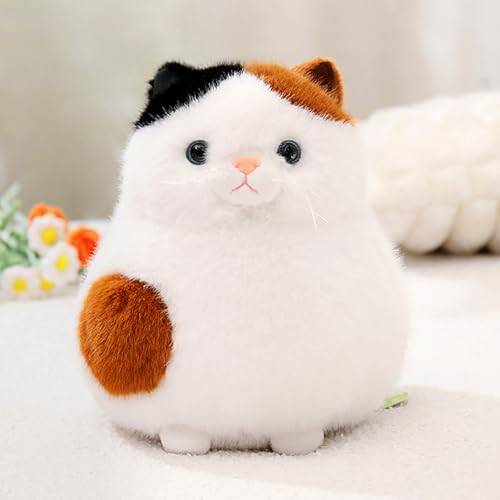Are Calico Cats Known for Meowing a Lot?
As a cat lover, you might be wondering if calico cats meow a lot. Well, the answer is not a simple yes or no. Calico cats, like any other cats, have their own unique personalities and vocal tendencies. While some calico cats may be more vocal than others, there are a few factors that can contribute to their meowing habits.
- Breed: Calico cats are not a specific breed, but rather a coat color pattern that can be found in different breeds. Different breeds can have varying levels of vocalization tendencies, so it’s important to consider the breed of your calico cat.
- Individual Personality: Each calico cat has its own unique personality, which can influence their meowing habits. Some calico cats may be naturally more talkative and express their needs or wants through meowing, while others may be quieter.
- Environmental Factors: The environment in which a calico cat is raised can also play a role in their meowing habits. If a calico cat is surrounded by noise or stressed due to changes in their environment, they may meow more frequently to communicate their discomfort.
- Attention-seeking: Calico cats, just like any other cats, may meow to get attention. They may want to play, be petted, or simply want your company. Providing them with enough stimulation and quality time together may help decrease excessive meowing.
- Health Issues: In some cases, excessive meowing can be a sign of an underlying health issue. If you notice a sudden change in your calico cat’s meowing behavior, it’s always a good idea to consult with a veterinarian to rule out any medical concerns.
While some calico cats may be more vocal than others, it’s important to remember that each cat is an individual. Your calico cat’s meowing habits may be influenced by a combination of factors such as breed, personality, environment, attention-seeking, and health.
Understanding your calico cat’s vocal tendencies and providing them with the care and attention they need can help you build a stronger bond with your furry friend. So, embrace the unique meowing habits of your calico cat, and enjoy the communication and companionship they bring into your life.
Factors that Influence a Calico Cat’s Meowing Habits
As a cat lover, you may wonder why your calico cat meows a lot. Don’t worry! There are various factors that can influence their vocal habits. Let’s explore them:
1. Breed: Different cat breeds have different meowing tendencies. While some breeds are naturally more vocal, others may be on the quieter side. Keep in mind that calico cats come in various breeds which means their meowing habits can vary too.
2. Personality: Just like humans, cats have unique personalities. Some calico cats may have more talkative and expressive personalities, leading them to meow frequently. It’s important to understand and accept your cat’s individuality.
3. Environmental Factors: Your cat’s immediate environment can play a significant role in their vocalizations. If your calico cat is in a noisy or stressful environment, they may meow more as a way to communicate or seek comfort.
4. Attention-Seeking Behavior: Calico cats, and cats in general, may meow more if they want attention or are feeling lonely. They might be seeking interaction, playtime, or your comforting presence. Providing them with the attention they crave can often reduce excessive meowing.
5. Health Issues: Sometimes, excessive meowing can be a sign of underlying health problems. If your calico cat’s meowing habits suddenly change or become more frequent, it’s important to consult a veterinarian. They can rule out any medical reasons for the behavior.
Remember, each cat is unique, and their meowing habits can be influenced by a combination of these factors. By understanding your calico cat’s individuality and providing them with the care and attention they need, you can strengthen your bond and create a harmonious living environment.
Let’s move on to some tips on how to manage your calico cat’s meowing habits. But first, let’s explore the possible benefits of having a talkative kitty companion.
1. Personality and Temperament
When it comes to calico cats, their meowing habits can be influenced by their personality and temperament. Just like humans, cats have their own unique traits and quirks that make them who they are. This is true for calico cats as well.
- Calm and Quiet: Some calico cats have a more reserved and calm nature. They may not meow as frequently as other cats. If you have a calico cat that falls into this category, consider yourself lucky! These cats tend to keep their meowing to a minimum and may only vocalize when they really need something.
- Chatty and Social: On the other hand, there are calico cats that have a more vocal and outgoing personality. These cats may love attention and want to communicate with you through their meows. They might meow more often to express their feelings or to get your attention. So, if your calico cat is a bit of a chatterbox, it’s just their way of connecting with you.
- Independent and Self-Sufficient: Some calico cats have an independent and self-sufficient nature. They may not feel the need to meow or seek attention from their human companions as much. These cats are content with their own company and may prefer their alone time. So, if your calico cat doesn’t meow much, it doesn’t mean they don’t love you; they just value their independence.
It’s important to remember that every calico cat is unique and their personality can affect their meowing habits. Understanding your calico cat’s individuality is key to nurturing a strong bond with them. Stay tuned for the next section, where we’ll dive into environmental factors that can influence a calico cat’s meowing.
2. Communication and Attention Seeking
Cats, including calico cats, use meowing as a way to communicate with their owners. They have different meows for different needs or desires.
- Attention-seeking: Calico cats that meow a lot may simply be seeking attention from their owners. They enjoy being around you and want your love and affection. When they meow persistently, it may be their way of saying, “Hey, pay attention to me!”
- Hunger: Like all cats, calico cats meow to let you know they are hungry. If you notice your calico meowing loudly and rubbing against you while near their food bowl, it’s a strong indication that mealtime is on their mind.
- Bathroom needs: Calico cats may meow to communicate their need to use the litter box. If their litter box is dirty or they are unable to access it, they may meow to let you know it’s time for a clean-up or for you to open the door.
- Loneliness: Calico cats, especially those who are more social and dependent, may meow when they are feeling lonely. They want companionship and may seek your attention by meowing for you to come and spend time with them.
Keep in mind that excessive meowing could also be a sign of an underlying health issue. If your calico’s meowing patterns suddenly change or become excessive, it’s always a good idea to consult with your veterinarian to rule out any medical concerns.
By understanding the various reasons behind your calico’s meowing, you can better meet their needs and strengthen the bond between you and your furry friend.
3. Health and Medical Conditions
When it comes to calico cats, their excessive meowing might not always be just a communication method. Sometimes, it can be a sign of underlying health issues that require attention. As a cat lover and enthusiast, it’s important to be aware of potential medical conditions that might be causing your calico cat to meow excessively. Here are a few common health concerns to look out for:
1. Urinary Tract Infections
Calico cats, like any other cat breed, can be susceptible to urinary tract infections (UTIs). UTIs can cause discomfort and pain, leading to excessive meowing as your calico cat tries to communicate their distress. If you notice your calico cat meowing more frequently than usual, especially while using the litter box, it’s crucial to consult your veterinarian to rule out a UTI.
2. Hyperthyroidism
Hyperthyroidism is a condition that affects the thyroid glands in cats. It can cause an increase in appetite and thirst, leading to excessive meowing in calico cats. If your calico cat is meowing constantly and seems unusually hungry and thirsty, it’s important to have them checked by a veterinarian who can run tests to diagnose hyperthyroidism.
3. Cognitive Dysfunction Syndrome
Just like humans, cats can also experience age-related cognitive decline. Cognitive Dysfunction Syndrome (CDS) can result in confusion, disorientation, and changes in behavior, including excessive vocalization. If your senior calico cat is meowing more frequently and showing other signs of cognitive decline like forgetfulness, it’s recommended to discuss these symptoms with your veterinarian.
Remember, while excessive meowing can be associated with these medical conditions, it’s essential to consult a veterinarian for an accurate diagnosis. They can perform the necessary tests and provide appropriate treatment options if any health concerns are identified.
By staying attentive to your calico cat’s meowing habits and being proactive about their health, you can ensure they receive the care they need. Remember, a healthy and happy calico cat is a meowing companion you can enjoy for years to come.
Tips for Dealing with Excessive Meowing in Calico Cats
It can be frustrating when your calico cat meows excessively, but there are ways to address this behavior and ensure your feline friend’s well-being. Here are some helpful tips for dealing with excessive meowing in calico cats:
1. Rule out any underlying health issues:
Excessive meowing can often be a sign that something isn’t right with your calico cat’s health. It’s essential to rule out any underlying medical conditions that might be causing the excessive meowing. Schedule a visit with your veterinarian to have your cat thoroughly examined and to discuss any concerns you may have.
2. Provide mental and physical stimulation:
Calico cats, like all cats, need mental and physical stimulation to keep them happy and content. Make sure your cat has plenty of toys, scratching posts, and interactive playtime to keep them engaged. This can help prevent boredom and reduce excessive meowing that may stem from frustration or a need for attention.
3. Establish a routine:
Cats are creatures of habit, and establishing a routine can help reduce anxiety and excessive meowing. Feed your calico cat at the same time every day, provide them with a consistent sleep environment, and stick to regular play and cuddle sessions. Predictability can bring a sense of security to your cat, helping to alleviate stress-related meowing.
4. Use positive reinforcement:
Rewarding your cat for good behavior can be an effective way to encourage calmness and decrease excessive meowing. When your calico cat is quiet and relaxed, offer treats, praise, and affection to reinforce their positive behavior. By associating quietness with positive rewards, you can encourage your cat to be quieter in the long run.
5. Consider pheromone therapy:
Pheromone therapy is a natural method that can help cats feel more relaxed and reduce excessive meowing. Synthetic pheromones, available in sprays, diffusers, and collars, mimic the calming pheromones cats produce naturally. These can create a soothing environment for your calico cat and help alleviate anxiety that may contribute to excessive meowing.
Conclusion
Now that you have learned about dealing with excessive meowing in calico cats, you have a variety of strategies to try. Remember, it’s important to consult a veterinarian to rule out any underlying health issues. Once you’ve done that, you can focus on providing mental and physical stimulation for your calico cat. This can include interactive toys, puzzle feeders, and play sessions. Establishing a routine can also help your cat feel more secure and reduce excessive meowing. Positive reinforcement, such as rewarding your cat when they are quiet, can be effective in encouraging desired behavior. Lastly, consider trying pheromone therapy, which can help to create a calming environment for your calico cat. By implementing these strategies, you can help reduce excessive meowing and create a happier and more peaceful environment for both you and your calico cat.
Frequently Asked Questions
Q: Why is my calico cat meowing excessively?
A: Calico cats may meow excessively due to various reasons, including underlying health issues, stress, boredom, or seeking attention. It’s essential to consult a veterinarian to rule out any medical conditions and address any potential health concerns.
Q: How can I reduce excessive meowing in my calico cat?
A: To reduce excessive meowing in your calico cat, provide mental and physical stimulation through interactive toys and play sessions. Set a consistent daily routine for feeding, play, and rest. Use positive reinforcement techniques to reward desired behavior and ignore excessive meowing. Additionally, consider using pheromone therapy, such as Feliway, which can help create a calming environment for your cat.
Q: Can excessive meowing be a sign of a health problem?
A: Excessive meowing can sometimes be a sign of an underlying health problem. If your calico cat’s meowing is sudden, persistent, or accompanied by other concerning symptoms like decreased appetite or frequent urination, it’s important to consult a veterinarian. They can perform a thorough examination and possibly recommend diagnostic tests to determine if there are any medical issues contributing to the excessive meowing.
Q: Is it normal for calico cats to meow a lot?
A: While some calico cats may naturally be more vocal than others, excessive meowing in calico cats is not considered normal behavior. It could be an indication that your cat is trying to communicate something or experiencing discomfort. Observing any changes in behavior and consulting with a veterinarian can help identify the cause of the excessive meowing and find appropriate solutions.
Q: How long does it take to see a reduction in excessive meowing?
A: The time it takes to see a reduction in excessive meowing can vary depending on the underlying cause and the effectiveness of the strategies implemented. With consistent implementation of behavioral and environmental modifications, you may start to see improvements within a few weeks. However, it’s important to have patience and continue the recommended strategies for an extended period before determining their effectiveness. If the excessive meowing persists or worsens, consulting with a veterinarian or a professional animal behaviorist is advised.

















